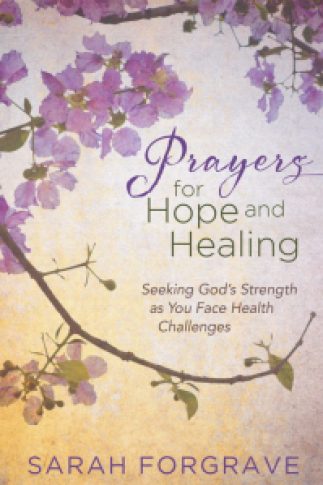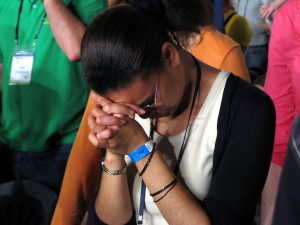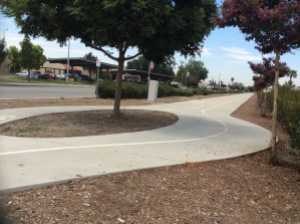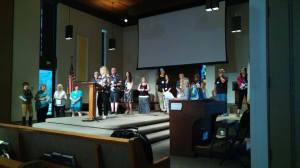How to Pray When You Don’t Know What to Say
“How to Pray When You Don’t Know What to Say” is a blog post by Sarah Forgrave (www.sarahforgrave.com), an introduction to her new book Prayers for Hope and Healing. I read Sarah’s article when she guest posted on Debbie W. Wilson’s Refreshing Faith website.
What caught my attention immediately was Sarah’s reference to her long-time approach to prayer; it was very much like what I’ve written about in my book Brokenness to Beauty, the ACTS in prayer which was so beneficial to me when I discovered it.
Here’s what I wrote in Brokenness to Beauty, Chapter 11 “Prayer: Just Do It … But How?”:
“I distinctly remember when, as a college student, I cried out … in frustration to God. My ‘prayer life’ wasn’t working. I would make my prayer list and start my prayers by asking God this and that for so-and-so, and I meant it wholeheartedly. This would last for a day or two, but time after time my fervor would dwindle into mechanical words read from a list. I knew I had to pray with my heart, but I didn’t know how to maintain the transfer from my head to my heart. I sincerely yearned to communicate with God and effect change through prayer on behalf of others in need, yet I usually ended up feeling that I was falling short. I didn’t know what to do about it, so I did the only thing I did know to do: I asked God to help me.
A few years later I was introduced to a simple way of entering into God’s presence in prayer, one that’s easy to remember and rooted in the Scriptures. It changed the way I prayed and as a result, changed my life. It is called the ACTS of prayer.[i]
The acrostic stands for:
Adoration. Approach God in humility, reverence, and awe, and worship him for who he is. We learn about him as we read and study the Bible. He is holy, and we must approach him as such (Luke 11:2).
Confession. Sin acts as a wall between us and God, effectively blocking our prayers (Isaiah 59:2). We need to be sensitive to God’s Spirit on a daily basis as he speaks conviction to us, confessing and repenting of all known sin as soon as we are aware of it. That way, communication with God remains open (1 John 1:8–9).
Thanksgiving. The greatest acceptable sacrifice we can make to God (along with laying our lives at his feet as a living sacrifice, as Paul tells us to do in Romans 12:1) is the sacrifice of thanksgiving and praise (Hebrews 13:15). Our prayers are to be seasoned with gratitude.
Supplication. This is the part we normally think of as prayer: asking God for something (Luke 11:9–10). Our requests must be couched in the reverence and worship due to God as we seek first his will in the matter, with our prayer purged of known sin through confession and repentance, wrapped in trust, and infused with thanksgiving.”
As I wrote, “It changed the way I prayed and as a result, changed my life.” It became the pattern for most of my prayers. When I read Sarah’s article, it seemed she used a similar way of praying.
But I also wrote in Brokenness to Beauty, “There are, of course, times when all we can do is burst out, ‘Lord help me!'” There are times when we are so burdened and feel so deeply our need, we cry out like the psalmists did, in the agony of our heart. We still approach God in humility and reverence, but we burst into his presence in the agony of our situation.
I think this is what Sarah found as well when she experienced tremendous physical struggles coping with a chronic disease, and she found prayer too was a struggle. Her method of approaching God felt insufficient in her time of need.
I understand fully, having lived with a chronic disease for over 50 years and having faced the trauma of breast cancer and treatment, and then the fractures of both my femurs, rods surgically implanted in them, and months of physical therapy. Life gets hard at times and what is familiar can seem inadequate for the present struggle.
That’s why I want to share Sarah’s blog post with you and introduce you to her book, Prayers for Hope and Healing. If you are struggling right now, or know someone who is, and prayer seems just as hard, the old familiar patterns inadequate, this article and Sarah’s book may be just what you need.

From the back cover of Prayers for Hope and Healing:
Amid Pain and Weakness…There is HOPE
Serious or chronic medical issues bring a litany of painful and confusing feelings that only someone else who’s been in a similar situation could possibly understand. Sarah Forgrave has walked the difficult road you find yourself on. And she empathizes with the uncertain future you face.
No matter the road ahead, you don’t have to face it alone. Even in the depths of your worst emotional and physical pain, God is right there beside you, offering His comfort, love, and peace.
As you read these heartfelt prayers and devotions, let this book be your manual to help navigate the difficult set of emotions that come with health issues. Read it front to back or go directly to the devotion addressing how you feel at any given moment…when you need it the most.
Above all, know that you are never, ever alone.
Read Sarah’s blog post as she shares “How to Pray When You Don’t Know What to Say”:
For most of my life, I approached prayer like a checklist. It went something like this. Adore God. Confess my sins. Thank Him for His forgiveness. Ask Him for what I want.
This checklist helped fill the awkward silence, but when life got hard, so did prayer.
Suddenly my adoration wasn’t so quick to rise to the surface. Instead of confession and gratitude, I was mad at God for letting me hurt. There were plenty of things I wanted Him to do, but I frankly didn’t have much faith He would follow through on them.
Have you found yourself in the same place?
To continue to read how Sarah learned to connect with God during hard times, you can see the full article here: https://debbiewwilson.com/how-to-pray/
Bio:
Sarah Forgrave is an author and wellness coach who loves inspiring others toward their full potential. In addition to her book, Prayers for Hope and Healing (Harvest House, October 2017), her writing credits include contributions to The Gift of Friendship, Guideposts’ A Cup of Christmas Cheer, and the webzine Ungrind. When she’s not writing or teaching, she loves to shop at Trader Joe’s or spend time with her husband and two children in their Midwest home. Visit Sarah at www.sarahforgrave.com, or at the following sites:
Facebook: www.facebook.com/AuthorSarahForgrave
Pinterest: www.pinterest.com/SarahForgrave
Instagram: www.instagram.com/SarahForgrave_Author
Twitter: www.twitter.com/SarahForgrave
[i] The ACTS of Prayer are explained at
http://prayercentral.net/engage-me/ways-to-pray/pray-with-acts
Be Careful How You Live
“Be Careful How You Live” was written by Ann Van Hine. I read this post on October 19, 2017 on the devotional blog “Laced with Grace” where Ann is a regular contributor. She also writes on her own website, “Random Ramblings: Thoughts from Everyday Life.” Ann and “Laced with Grace” graciously gave me permission to reblog her post so I could share it with you.
And I wanted to share Ann’s post with you because she says so well and concisely some of the things I too have written in blog posts, in my book Brokenness to Beauty,* and in the Brokenness to Beauty Bible Study (still a work in progress). I like her illustrations that bring home the message being considered.
When I read Ann’s opening quote below, taken from Schreve’s book, I thought of Solomon’s words, “Do not say, ‘Why is it that the former days were better than these?’ For it is not from wisdom that you ask about this” (Ecclesiastes 7:10). I always inwardly chuckle and shake my head when I hear people do exactly what the wisest man who ever lived said not to do.
Equally applicable, pertaining to our future is James 4:13–15, “Come now, you who say, ‘Today or tomorrow we will go to such and such a city … .’ Yet you do not know what your life will be like tomorrow. You are just a vapor that appears for a little while and then vanishes away. Instead, you ought to say, ‘If the Lord wills, we will live and also do this or that.’” Do we really mean “Your will be done on earth as it is in heaven,” when we pray? Are we really taking Jesus at his word to seek first God’s kingdom and righteousness, not all the other stuff of life?
And we do well to take heed to Paul’s admonition in Philippians 3:13, 14, quoted below, to leave our past behind us—all the bad and the good in our lives—and hotly pursue Jesus Christ and the purposes of God. Today.
And finally, in a world inundated with distractions (read media, social and otherwise), we must learn to “Be here now,” as Randy used to teach our summer staff at Mustard Seeds and Mountains. Live in the Today God has given us.
Enough commentary. Here is Ann’s post, “Be Careful How You Live.” Leave a comment on her site or mine to let us know how God encouraged you through this little article.
In Jeff Schreve’s book Real Encouragement for Real Life, he states:
“I have found that a good number of people live in the past. They live longing for the good ole days – or mourning past failures, wishing they could go back and do it over again…God wants us to learn from the past and let go of the past. While some live in the past, others life in the future…Living in the future also robs you of the precious present because tomorrow may never come. All we have to live in is today. Certainly, we are to plan for tomorrow, but we are to live in today and make the most of each day.”
As we discussed these ideas in Sunday School this past Sunday someone commented that living in the past is like driving while constantly looking in the rearview mirror. Unfortunately, I had a story about that. A few years ago, my mother was so worried about the person driving behind her that she failed to navigate the off ramp on to her street. She took down a highway sign, a light post and stopped just feet from a tree all within yards of her home. Thankfully she wasn’t injured but the car was totaled. Rearview mirrors are useful but we need to drive looking through the windshield.
“Brothers and sisters, I do not consider myself yet to have taken hold of it. But one thing I do: Forgetting what is behind and straining toward what is ahead, I press on toward the goal to win the prize for which God has called me heavenward in Christ Jesus.” Philippians 3:13 – 14.
I think another hazard for us today is we can be somewhere but not “be” present because of technology. I can be with you but be texting someone else or googling something. Technology is great but being present, being in the now is hard. N.O.W. = No Other Worries or Work. Giving my full attention to those who I am with at this moment for me that would be making the most of every opportunity. And isn’t that what Jesus did. He was always fully present with whomever he was with. I saw a church sign once that said, “Jesus never hurried.” That is another great thing to strive for.
“Be very careful, then, how you live—not as unwise but as wise, making the most of every opportunity, because the days are evil.” Ephesians 5:15-16

About Ann:
I am a mom of grown daughters, widow of a FDNY firefighter, retired small business owner, volunteer docent, children’s ministries worker, friend, avid reader, published writer, event speaker and breast cancer survivor. In 2015 I got a new title – Mom-mom. On long car rides, I like to drink coffee, eat sour patch kids and listen to podcasts – West Wing Weekly and the Moth are my favorites.
According to the Clifton StrengthsFinder, my strengths are achiever, connectedness, input, learner and intellection. In other words, I like “to do lists”, believe everything is connected, I’m inquisitive, love to learn and like to think.
*Purchase Brokenness to Beauty: Transforming Your Brokenness into a Beautiful Life on Amazon.
Pursuing Life with Courageous Compassion
Several months ago I had the privilege of reading and reviewing Susanne Maynes’ first book, Unleashing Your Courageous Compassion: 40 Reflections on Rescuing the Unborn. You can read my review on Amazon. I was so impressed with Susanne’s devotional book that I bought copies to give to friends.
Susanne Maynes has the credentials for writing such a book. She has been involved in life-affirming ministry for ten years, is the Counseling Director at Life Choices Clinic, a pregnancy resource center in Lewiston, Idaho, and is certified as a Biblical Counselor by the Board of Christian Professional and Pastoral Counselors. She has been married to Scott for 34 years, and they have three married sons and four delightful grandchildren (so far). Susanne blogs about church and culture, spiritual growth, and Christian parenting at susannemaynes.com, and regularly guest posts for Heartbeat International’s pregnancyhelpnews.com.
This interview is about her book, Unleashing Your Courageous Compassion: 40 Reflections on Rescuing the Unborn.
- What prompted you to start writing Unleashing Your Courageous Compassion?
Entering the world of pregnancy resource center ministry was eye-opening and life-changing for me. Although I considered myself pro-life, I was the sheltered church lady who didn’t have a clue about the issues surrounding most unplanned pregnancies. As my passion for this ministry grew, I began writing poems based on my conversations and interactions at the clinic.
A few years ago, my husband came home from a Great Turnaround training event with Dr. Bruce Wilkinson. As Scott described how Bruce had asked the group, “What does God want done?” I heard the Holy Spirit say to me, “Forty poems.”
I assembled the poems I was writing, along with some I’d already published, and wrote daily devotionals to go with them to create a 40-day journey toward pro-life ministry.
- They say an author should write their book for an audience of one. Who was the “audience” that inspired you to write this book?
One day years ago, a lady came to the clinic in hopes of volunteering with us. Each time I explained an area of ministry where she could help, her response was, “Oh, I don’t think I could do that.”
I could see that she had much to offer young people facing unplanned pregnancies, yet her fears prevented her from ministering. She never did join our team. I want to encourage others who’ve let intimidation hold them back. The field is white and the laborers few!
- Other books exist which explain the pro-life mission and invite people to join the cause. What makes this book unique?
I greatly appreciate, and have quoted, authors like Randy Alcorn (Why Prolife) and John Ensor (Answering the Call). Their material has been a great help to me. John gave me some personal tips for my manuscript, for which I am extremely grateful.
What makes my book unique is its format as an educational devotional. Each day’s poem serves as a word picture engaging the right side of the brain. Next comes the day’s reading, including relevant statistics and facts, and then a related Scripture verse. Last, there’s a journaling prompt so readers can process what they’ve read that day.
In this way, I take you, the reader, inside the four walls of a pregnancy enter so you can experience how this ministry works, how vital it is, and what it would look like to participate.
- In what ways is pregnancy center ministry a non-threatening yet highly effective way to do pro-life work?
Pregnancy center work is a great way to change our culture one conversation at a time. We tend to stay out of the political arena. There’s no need to hold up signs or be publically confrontational.
Offering compassion, hope and help during a pregnancy decision process is a very effective way to save lives and share the gospel, because lives change when people know you care.
- In what ways is pregnancy center ministry more challenging than other parachurch ministries?
We are very careful with confidentiality. The folks we serve are not proud of the fact that they are considering abortion (or have had one). It’s difficult to find those who are willing to let their stories be told.
Additionally, many whom we serve live in poverty and deal with other issues besides unplanned pregnancies. That means their lives aren’t necessarily made “all better” when they make a decision for life for their child.
This can be difficult for our supporters to understand, because they love to see a live baby at fundraising events, and hear a dramatic story of turnaround. Those kinds of live testimonies can be few and far between.
- You’ve been doing this ministry for ten years. What inspires you to keep going?
I love partnering with God in bringing the good news of the gospel into people’s lives. At the clinic, I’ve had far more opportunities than ever before to talk about Jesus, introduce people to him, pray for them, and ask them good questions to help them grow in their knowledge of God.
I’ve been richly blessed to participate in helping save the lives of people who may otherwise have died in the womb. I’ve experienced exponential growth in my understanding of culture and how to encourage people toward faith in Christ. I get to reflect both God’s justice and his mercy.
All this, and there’s an eternal reward coming as well!
- Any final encouraging words?
If I can do this, you can, too. There are women and men who need you to come alongside them. There are pre-born children whom you could help rescue from abortion. Maybe God has poured more into you than you realize. Maybe he’s prepared you for this ministry for such a time as this.
I hope and pray you’ll go on this 40-day journey to find out.
Unleashing Your Courageous Compassion: 40 Reflections on Rescuing the Unborn is available on Amazon.
Goliaths and Greater Things
In my last post I pointed out that David was faithful in his everyday, ordinary life as a shepherd, guiding and guarding the sheep, and sometimes fighting lions and bears at great personal risk. It was there, in his everyday life, that he grew strong wielding the weapons of his trade—the staff and sling and stones—and he grew strong in faith in God. He knew God and could confidently say, “the LORD who delivered me from the paw of the lion and the paw of the bear …”
We too live ordinary, everyday lives. We too face our lions and bears, those trials and difficulties that come into our lives, perhaps threatening our livelihood, our health, our families or even our very lives. These are the enemies that come to defeat us, enemies that threaten to destroy us.

Are we being faithful to fight them with the weapons given us—prayer and praise and the Word of God? Are we becoming adept in their use and growing in strength, growing in our trust in God? Can we say as David did, “the LORD who delivered me from the paw of the lion and the paw of the bear …”?

It is only in our ordinary, everyday lives, faithfully facing the enemies that would destroy us—our lions and bears—that we learn to fight, becoming skilled and strong to defeat the enemy.

Ordinary life is where we learn to know and trust the LORD, bringing him glory as we fight our personal enemies.
This, too, is where we learn to recognize another kind of enemy: Goliath.
Goliath wasn’t David’s personal enemy and he isn’t ours, though most of us have heard the story in those terms.
Considering the biblical text (I Samuel 17), Goliath is a different sort of enemy. Goliath comes against and defies the armies of the living God; he defies the LORD of Hosts, the Lord Almighty.
Goliath is anything that is contrary to the person and purposes of God and he must be fought with weapons, not of this world, but weapons that have “divine power to demolish strongholds … and everything that sets itself up against the knowledge of God …” (2 Corinthians 10:4-5). What are these weapons?
Prayer and praise and the Word of God. The same weapons we use in our everyday lives. Powerful weapons that we only become skilled at using by fighting our lions and bears, the trials that come to us in our ordinary, everyday lives.
The power of these weapons is spiritual, not of our flesh or the world, not originating with us but with God’s Spirit who lives in us.
Unlike David, who refused to wear the armor given him by King Saul because it didn’t fit and David hadn’t tried it to become skilled in its use, we do have full armor given us by God. It fits us; it is powerful and effective when we become used to using it in our everyday lives. Paul outlined this armor in Ephesians 6:10-18 (TLB):
10 “Last of all I want to remind you that your strength must come from the Lord’s mighty power within you. 11 Put on all of God’s armor so that you will be able to stand safe against all strategies and tricks of Satan. 12 For we are not fighting against people made of flesh and blood, but against persons without bodies—the evil rulers of the unseen world, those mighty satanic beings and great evil princes of darkness who rule this world; and against huge numbers of wicked spirits in the spirit world.
13 So use every piece of God’s armor to resist the enemy whenever he attacks, and when it is all over, you will still be standing up.
14 But to do this, you will need the strong belt of truth and the breastplate of God’s approval. 15 Wear shoes that are able to speed you on as you preach the Good News of peace with God. 16 In every battle you will need faith as your shield to stop the fiery arrows aimed at you by Satan. 17 And you will need the helmet of salvation and the sword of the Spirit—which is the Word of God.
18 Pray all the time. Ask God for anything in line with the Holy Spirit’s wishes. Plead with him, reminding him of your needs, and keep praying earnestly for all Christians everywhere.” (Emphases added.)
When Jesus was on earth he fought many Goliaths. When he was about to leave earth and return to his Father in heaven he said to his disciples, “Very truly I tell you, whoever believes in me will do the works I have been doing, and they will do even greater things than these, because I am going to the Father. And I will do whatever you ask in my name, so that the Father may be glorified in the Son. … And I will ask the Father, and he will give you another advocate to help you and be with you forever—the Spirit of truth. … For he lives with you and will be in you” (John 14:12-17, emphasis added).
Jesus obviously expected that we too would fight, not only lions and bears, but Goliaths. All over the world. Else what did he mean by saying, “But you will receive power when the Holy Spirit comes on you; and you will be my witnesses in Jerusalem, and in all Judea and Samaria, and to the ends of the earth” (Acts 1:8)? (Notice the triple “and.” We as God’s people are to be witnesses in Jerusalem, and …, and …, and ….)
Or this, “All authority in heaven and on earth has been given to me. Therefore go and make disciples of all nations, baptizing them in the name of the Father and of the Son and of the Holy Spirit, and teaching them to obey everything I have commanded you. And surely I am with you always, to the very end of the age” (Matthew 28:18-20)?
The Spirit was given for specific purposes. He gives us strength to combat our bears and lions in our ordinary lives. And he empowers us to bear witness to who Jesus is, what he has done, and teach others what he taught. Fighting Goliaths. The Spirit fighting for us for God’s glory.
The questions we must ask ourselves are:
- Do I recognize Goliath when I see him? He defies the armies of the living God. He mocks God to his face.
- When I do see him, do I have the spirit of David that says, “Who is this uncircumcised Philistine that he should defy the armies of the living God?”
- And do I have the chuztpah to reply to the naysayers as David did, drawing on his experience of trusting God and finding him faithful to deliver, “Your servant has been keeping his father’s sheep. When a lion or a bear came and carried off a sheep from the flock, I went after it, struck it and rescued the sheep from its mouth. When it turned on me, I seized it by its hair, struck it and killed it. Your servant has killed both the lion and the bear; this uncircumcised Philistine will be like one of them, because he has defied the armies of the living God. The Lord who rescued me from the paw of the lion and the paw of the bear will rescue me from the hand of this Philistine (1 Samuel 17:34-37, emphasis added).”
- Do I have the jealousy for God’s Name that makes me willing to put “skin” in the game, my skin, for his Name and glory?
The greater works we are to do, that Jesus expects us to do, are waiting to be done. They are there waiting for us to step forward, as David did, in the Name of the Lord Almighty, that the Father may be glorified in the Son—through us.
“David said to the Philistine, ‘You come against me with sword and spear and javelin, but I come against you in the name of the Lord Almighty, the God of the armies of Israel, whom you have defied. This day the Lord will deliver you into my hands, … and the whole world will know that there is a God in Israel. All those gathered here will know that it is not by sword or spear that the Lord saves; for the battle is the Lord’s, and he will give all of you into our hands’”(1 Samuel 17:45-47 NIV, emphasis added).
Let us get stronger every day wielding the weapons of our warfare—prayer and praise and the Word of God—fighting our everyday lions and bears so that we may be strong in the Spirit and fit to recognize and fight Goliath—doing those greater things—for the sake of his Name, for the glory of the Father.
Let us fear God more than men.
How have you fared with your lions and bears? Are you growing stronger and more confident in the Lord through your trials? Have you discerned the Goliath, who defies the living God, that you should be challenging him for the sake of God’s Name? How is it going?
Send me your questions and comments about this post. I’d love to hear your thoughts.
Scriptures from Holy Bible, New International Version®, NIV® Copyright ©1973, 1978, 1984, 2011 by Biblica, Inc.®Used by permission. All rights reserved worldwide.
Living Bible (TLB) The Living Bible copyright © 1971 by Tyndale House Foundation. Used by permission of Tyndale House Publishers Inc., Carol Stream, Illinois 60188. All rights reserved.
Scriptures copied from https://www.biblegateway.com
Photo credits:
Photo of woman praying at a conference, Centerpoint Church, 2017
Photo of man (Praise) by Oleander IMG_5787
Photo of Bible by pt1wzi-by-jclk8888-img_7190_p.jpg
Adapted and reposted from original blog post of November 3, 2015.
Fighting Everyday Lions and Bears
Fighting lions and bears. That’s what David said.
“When a lion or a bear came and carried off a sheep from the flock, I went after it, struck it and rescued the sheep from its mouth.” He went on to declare, “When it turned on me, I seized it by its hair, struck it and killed it.”[1]
Now, I’ve seen a bear close up. Sure, it was at night and all I could see was a big round, furry looking thing lumbering swiftly away from me, but I knew it was a bear. We saw its tracks in the snowy yard the next morning and followed the trail of garbage up the hill into our neighbor’s yard. No sheep, just garbage. Hungry bears apparently are not fussy about their meals. From the size of that behind and the paw tracks it left, I’m glad it wasn’t running toward me!

A lion and a bear. Running after it. Grabbing the sheep from its jaws and then grabbing the beast by the hair and killing it. That is an amazing feat. Done not once but twice. All in the line of duty. Just part of the ordinary life of a shepherd.
David was responsible and dependable. He could be trusted to take care of business, in this case, sheep keeping: guarding and guiding.
David was faithful to guide and guard and fight, doing what he had to do; he did the right thing, even at great risk to himself. He may have had the scars to prove it. He used the weapons of his profession—the sling and stones and staff—becoming adept in their use. In the process of fighting the lion and bear he grew skilled and strong.
His faith in God grew as well, for David knew he didn’t do his fighting alone. “The LORD who delivered me from the paw of the lion and the paw of the bear ….”
David was faithful in his everyday, ordinary life. He trusted in God.
We all live ordinary lives. We all face our lions and bears, those trials and difficulties that come into our everyday, ordinary lives, perhaps threatening our livelihood or even our life. These are the enemies that come to snatch away our lives, enemies that threaten to destroy us. Are we being faithful to fight them with the weapons given us—prayer and praise and the Word of God? Are we becoming adept in their use and growing in strength, growing in our trust in God? Can we say as David did, “the LORD who delivered me from the paw of the lion and the paw of the bear …”
It is only in our ordinary, everyday lives, faithfully facing the enemies that would destroy us—our lions and bears—that we learn to fight, becoming skilled and strong in spirit.
Ordinary life is where we learn to trust the LORD and become adept at wielding the weapons he has given us—prayer, praise and the Word of God.
What bears or lions are you facing today? Health issues, fearful job or financial challenges, death or disease of a loved one, divorce, addiction? So many beasts that would tear us apart and destroy us. Only by wielding the weapons of prayer, praise (yes, praise) and the Word of God, in the power of God’s Spirit, can we successfully defeat such enemies.
10 Finally, be strong in the Lord and in the strength of His might. 11 Put on the full armor of God, so that you will be able to stand firm against the schemes of the devil. 12 For our struggle is not against flesh and blood, but against the rulers, against the powers, against the world forces of this darkness, against the spiritual forces of wickedness in the heavenly places. 13 Therefore, take up the full armor of God, so that you will be able to resist in the evil day, and having done everything, to stand firm. 14 Stand firm therefore, having girded your loins with truth, and having put on the breastplate of righteousness, 15 and having shod your feet with the preparation of the gospel of peace; 16 in addition to all, taking up the shield of faith with which you will be able to extinguish all the flaming arrows of the evil one. 17 And take the helmet of salvation, and the sword of the Spirit, which is the word of God. 18 With all prayer and petition pray at all times in the Spirit, and with this in view, be on the alert with all perseverance and petition for all the saints. (Ephesians 6:10-18)
15 Through Him then, let us continually offer up a sacrifice of praise to God, that is, the fruit of lips that give thanks to His name. (Hebrews 13:15)
But that’s not the end of the story. Fighting lions and bears has another vastly important function in our everyday, ordinary lives. For only as we learn to rely on God and fight those enemies successfully will we, like David, recognize and be fit to face the giant, Goliath, who defies the armies of the Living God.
More on that in my next blog post.
[1] 1 Samuel 17:34-37
Adapted from original blog post of October 27, 2015
5 Steps to a Life that Counts–Forever
“But all these things that I once thought very worthwhile—now I’ve thrown them all away so that I can put my trust and hope in Christ alone. Yes, everything else is worthless when compared with the priceless gain of knowing Christ Jesus my Lord. I have put aside all else, counting it worth less than nothing, in order that I can have Christ, and become one with him, no longer counting on being saved by being good enough or by obeying God’s laws, but by trusting Christ to save me; for God’s way of making us right with himself depends on faith—counting on Christ alone. Now I have given up everything else—I have found it to be the only way to really know Christ and to experience the mighty power that brought him back to life again, and to find out what it means to suffer and to die with him. So whatever it takes, I will be one who lives in the fresh newness of life of those who are alive from the dead.
“I don’t mean to say I am perfect. I haven’t learned all I should even yet, but I keep working toward that day when I will finally be all that Christ saved me for and wants me to be.
“No, dear brothers, I am still not all I should be, but I am bringing all my energies to bear on this one thing: Forgetting the past and looking forward to what lies ahead, I strain to reach the end of the race and receive the prize for which God is calling us up to heaven because of what Christ Jesus did for us.
“I hope all of you who are mature Christians will see eye-to-eye with me on these things, and if you disagree on some point, I believe that God will make it plain to you— if you fully obey the truth you have.
“Dear brothers, pattern your lives after mine, and notice who else lives up to my example.” (Philippians 3:7-17 TLB)
In my last blog post I quoted from Lesson 2 of the Brokenness to Beauty Bible Study Guide that I have been working on for over a year (yet to be published). I wrote:
“We learn about God and his ways by reading Scripture day after day, year after year, relying on God’s Spirit to teach us spiritual truths, as 1 Corinthians 2:10–13 states.
When our reading of and obedience to Scripture is combined with teaching by God’s Spirit, we are strengthened to endure and to persevere through the difficulties of life, whether our difficulties be small or great.”
The lesson continues:
“5. Read again Philippians 3:7–16 (I’ve quoted it above, plus v. 17). From the Word of God we learn how to live according to God’s ways. We should strive to come to the point where we can personalize Paul’s commitment to the Lord, making the goals he made for his life our own.”
In the lesson I then ask the student to list the commitments one makes when they read and personalize what Paul wrote in the Philippians passage, quoted above. When you read the passage, what commitments do you list from Philippians 3:7-16?
Briefly, I can name:
1) let go of everything in this life that is important to me (it’s all temporary) to gain something greater (that lasts forever);
2) which is to know Jesus Christ, to follow him with all my heart and being;
3) to gain, by faith in him, his imputed righteousness and give up holding onto my own useless righteousness;
4) follow hard after Jesus by obedience to God’s Word, seeking what will last for eternity, not a few years of life;
5) and live for God’s plans, not my own, reaching forward to receive the prize for which God called me in Christ Jesus.
In Philippians 3:17 Paul admonishes us to follow him as he follows Christ. Am I doing that? Are you doing that? Can those who observe our lives safely follow us as we follow Christ?
Paul’s life goals challenge me, and you, to examine and choose what kind of people we are becoming. It reminds us to ask ourselves, “By my life, what am I leaving for others to follow? What will benefit others forever?”
Am I leaving a legacy that will eternally benefit my children, grandchildren, and others who observe, and are influenced by, my life?
What is my legacy? What is your legacy?
The answer to that depends on what we do with what we see when we look into the mirror of God’s Word.
Recall James 1:22-25 and Bill’s post, “The Man in the Mirror,” reblogged in my last posting. Am I, are you, putting what we hear of the Word of God into practice? Are we beginning to look more like Jesus? Are we living for God’s plans?
“Let the word of Christ richly dwell within you,
with all wisdom teaching and admonishing one another … “ (Colossians 3:16 NASB)
The Man In The Mirror
In Lesson 2 of The Bible Study Guide I write:
“We learn about God and his ways by reading Scripture day after day, year after year, relying on God’s Spirit to teach us spiritual truths, as 1 Corinthians 2:10–13 states.
When our reading of and obedience to Scripture is combined with teaching by God’s Spirit, we are strengthened to endure and to persevere through the difficulties of life, whether our difficulties be small or great.”
I recently read a post by Bill on his blog “Unshakable Hope,” which vividly and poignantly captures thoughts on the question of “Who am I becoming?” as I look into the mirror.
I can see the changes physically when I look in the mirror in the bathroom. What about the changes, and those that need to take place, when I look into the mirror of God’s Word? Who am I becoming?
Read James 1:21-25, quoted here from The Living Bible:
So get rid of all that is wrong in your life, both inside and outside, and humbly be glad for the wonderful message we have received, for it is able to save our souls as it takes hold of our hearts.
22 And remember, it is a message to obey, not just to listen to. So don’t fool yourselves. 23 For if a person just listens and doesn’t obey, he is like a man looking at his face in a mirror; 24 as soon as he walks away, he can’t see himself anymore or remember what he looks like. 25 But if anyone keeps looking steadily into God’s law for free men, he will not only remember it but he will do what it says, and God will greatly bless him in everything he does.
I’m reblogging Bill’s post, “The Man in the Mirror,” in the hope that you will be as challenged as I was by what Bill writes. I listen to what Bill has to say because he is living proof of the truth of God’s word. He is living out our unshakable hope in Jesus Christ.
Read his post and see why I say those things.
After you’ve read Bill’s post, I encourage you to leave him a reply, then come back to my blog ,brokennesstobeauty.wordpress.com , and leave me a note. I’d like to hear from you. What did you get from Bill’s blog post?
“Let the word of Christ richly dwell within you,
with all wisdom teaching and admonishing one another … “ (Colossians 3:16)
(Reblogged from “The Man in the Mirror,” posted August 3, 2017, on Bill’s blog “Unshakable Hope,” https://unshakablehope.wordpress.com/author/bsweeney60/ )
Encounters Along the Path
I met Ethel[1] on the bike path again today. We walk early in the morning to avoid the southern California heat, and sometimes encounter one another. Ethel is a woman of God. I’m always happy to see her.
This morning we talked about our mutual concern for the homeless men and women we see on the streets around our homes. We’ve both said, “Lord, what can I do? What would You have me do?” Ethel is a woman of prayer, and a woman of action in obedience to the Lord. I’m convicted and encouraged by her.

As we walked and talked, Ethel and I were surprised to discover we both have concern for the same homeless man. At different times, independent of one another, we have seen him sitting outside a small church building along our walking route. His name is Tommy[2]. I know this because every Thursday morning Tommy attends the same Bible study at church that I attend.
One day, not long after I started attending the Bible study, Tommy walked into the building, backpack in hand, and asked if he could join us. Our group, used to homeless men and women around our church, welcomed him into the Bible study.
Every week Tommy gets his cup of coffee, opens his Bible and appears to follow along. He contributes to the discussion at times. But Tommy’s mind lives in a parallel universe; his comments make no sense to the rest of us. We listen politely and try to respond as best we can.
I began praying that God heal Tommy’s mind. I pray for him the same as I pray that God heal the bodies of those who are sick or injured. Jesus came to destroy the works of the devil. Those works are at the root of all that has gone wrong with us spiritually and physically; mind and body and soul.
The New Testament gospels overflow with demonstrations of the destruction of the works of the devil by Jesus and his apostles as they taught the gospel of the Kingdom of God, healed and cast out demons. The final blow to the devil was Jesus’ death and resurrection. The major battle has been won.
Now we are in the mopping up period after that decisive battle; we live in the age of the Acts of the Holy Spirit. Since God the Father gave Jesus all power and authority, Jesus has commanded us, his followers, to continue his works in his world. He gave us his Spirit to do these works.
Ethel and I know God is at work, and we get to be part of it. When two people independently have burdens for the same person, are praying for him, and reaching out to him, you know God is up to something.
God wants to reach, redeem and restore Tommy.
Will you join us in seeing the Kingdom of God come to life within Tommy?
[1] Her real name, with her permission to use it.
[2] Not his real name.
High Expectations: Met
Home again. I feel relief flood through me as I pull into my driveway. Home safe, after driving for an hour in high-speed traffic, negotiating southern California freeways.
Last week I attended the first ever SoCal Christian Writer’s Conference held on the beautiful campus of Biola University in LaMirada, CA. I’d never been to LaMirada, never been to Biola, and of course, since this was the very first annual SoCalCWC, I’d never been to it either. A big bundle of firsts!

There is always trepidation as I anticipate travel to a new location, meeting new people, and the need for pushing myself out of my introvert’s alone-place of comfort and security.
Thank goodness for a user-friendly GPS to find my way to Biola in LaMirada. Thank the Lord for his presence with me (even introverts don’t like being absolutely alone), and his grace to help me move out of my shy self to meet new people and even make new friends.
But why would I put myself through these challenges, three times now, to attend Christian writer’s conferences? Because I have learned that I need these events. Each time I’ve attended a Christian writer’s conference my expectations have been met on two levels:
The anticipated—the things I figured I’d take away—learning new information, gaining tools of the craft, and receiving encouragement. Experts in the fields of writing, publishing and marketing spoke in general sessions, classes, workshops, and one-on-one appointment times.
The unanticipated—the surprises—one time a challenge to create a different book title (that’s why I have the hope-filled Brokenness to Beauty book title, the biggest take-away from my second conference), and most special of all, making new friends.
One of the most important aspects of a writer’s conference is simply being around other writers who are passionate about their writing and getting it out there for others to read. Their enthusiasm is almost infectious. It gave me a boost I sorely needed. Writers need other writers and where best to find them than at a writer’s conference.

A significant factor of a Christian writer’s conference is that the people involved are also passionate about Jesus Christ and his kingdom. This creates added impetus to get our words, the message God has laid on our hearts, into the hands of our readers.
The SoCalCWC met and exceeded all my expectations, both the anticipated and unanticipated! I’m glad I gathered up my courage, braving freeways and meeting new people, to attend. Kudos to director Kathy Ide and all who contributed to make a great conference.


